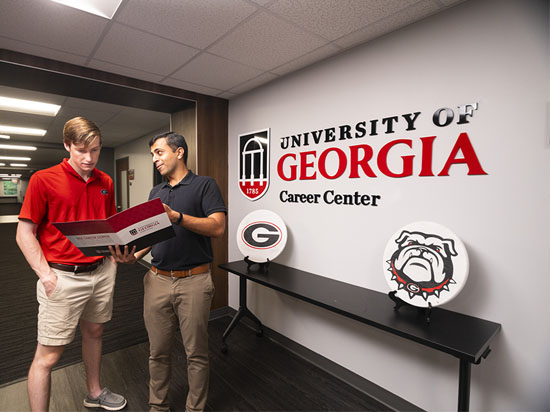Campus Tools, Career Wins

For student-athletes juggling academics and competition, campus resources can feel like just another thing on an already packed to-do list. But tapping into the career development tools available on campus can create real advantages, opening doors that lead well beyond graduation day. From career centers and alumni networks to resume workshops and internship programs, your school has invested in your success—and knowing how to use those tools can be a game-changer.
The campus career center is often the most underused goldmine. These offices offer everything from one-on-one coaching and resume help to mock interviews and job fairs. Even if you’re not sure exactly what you want to do after college, stopping by early in your college journey can help you build clarity and confidence. The earlier you start working with them, the more they can help you identify paths that align with your strengths and interests.
Don’t underestimate the power of your school’s alumni network. Most universities have platforms, databases, or LinkedIn groups where you can find graduates in your desired industry—some of whom were student-athletes too. Reaching out for an informational interview or quick coffee chat can lead to mentorship, internship offers, or simply a better understanding of your career options. You already share something in common—your school pride—and that alone can make a big difference.
Your professors are another key resource. Many have industry experience, personal connections, or know of job opportunities related to your major. Showing up to office hours, engaging in class, or asking for career advice can open up new pathways. Professors are often thrilled to support students who take initiative—and they can become strong recommenders when it’s time to apply for internships, jobs, or graduate programs.
Campus-hosted events are also a great way to build momentum. From career fairs and speaker series to employer info sessions and skill-building workshops, there’s often something happening every week that can move your career forward. You may even get exposure to companies that have specific programs designed for student-athletes or entry-level professionals.
Many student-athletes don’t realize that their athletic departments also offer resources beyond sports. Some departments provide career coaches, networking nights with former athletes, or partnerships with employers who are looking to hire athletes specifically because of their work ethic and discipline. Ask your coaches or advisors if there’s a liaison or program focused on life after sport—you might be surprised by what’s already in place.
Internships are another essential part of the puzzle, and your campus likely has a system to help you land them. Whether it’s through your academic department or the central career center, look for internship databases, funding programs, or connections to local businesses. Even short-term or unpaid roles during your offseason can give you a leg up.
Then there’s your school’s tech stack. Most universities offer access to career platforms like Handshake, Big Interview, or LinkedIn Learning. These can help you practice interviewing, learn new skills, or find job opportunities targeted specifically to students. Taking just an hour to explore these platforms can save you time and stress later.
For those interested in entrepreneurship, more and more campuses are offering incubators or entrepreneurship centers. These are safe spaces where students can test ideas, attend pitch competitions, or get free mentorship from successful founders. If you’ve ever dreamed of turning a hobby or hustle into a business, these centers are the perfect place to start.
If you’re unsure where to begin, just start small. Book an appointment with the career center. Attend one event. Email one alumni. Each small step builds momentum. Over time, the network and confidence you build will make a real difference as you transition into the workforce.
College is one of the few places where resources are built entirely around your success. The key is knowing they exist—and choosing to use them. For student-athletes used to grinding every day to improve, taking advantage of campus career tools is just another way to train for the future.

